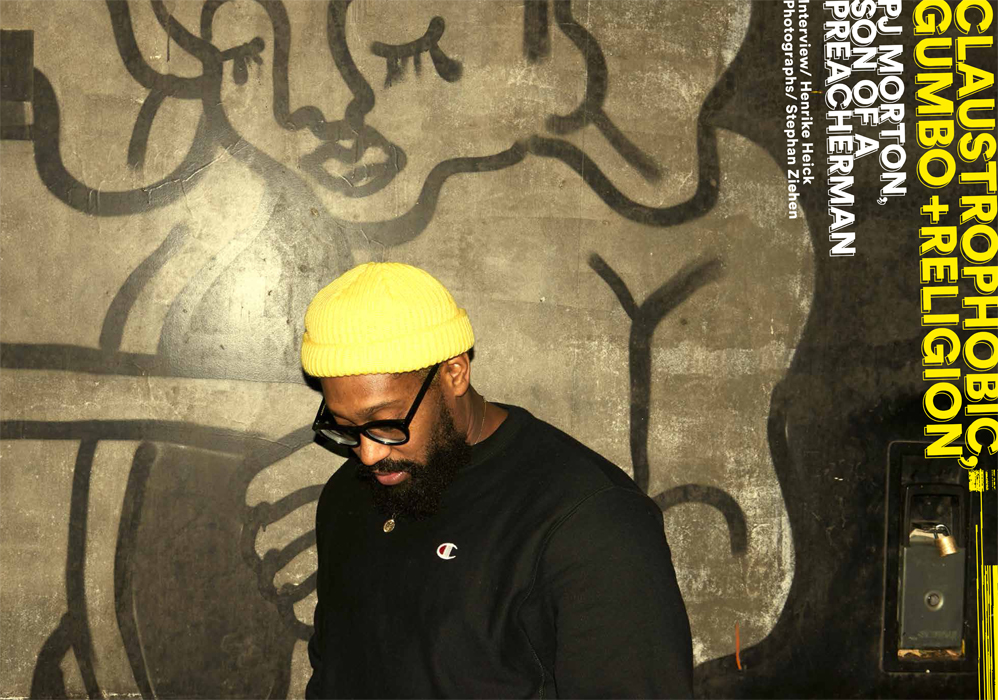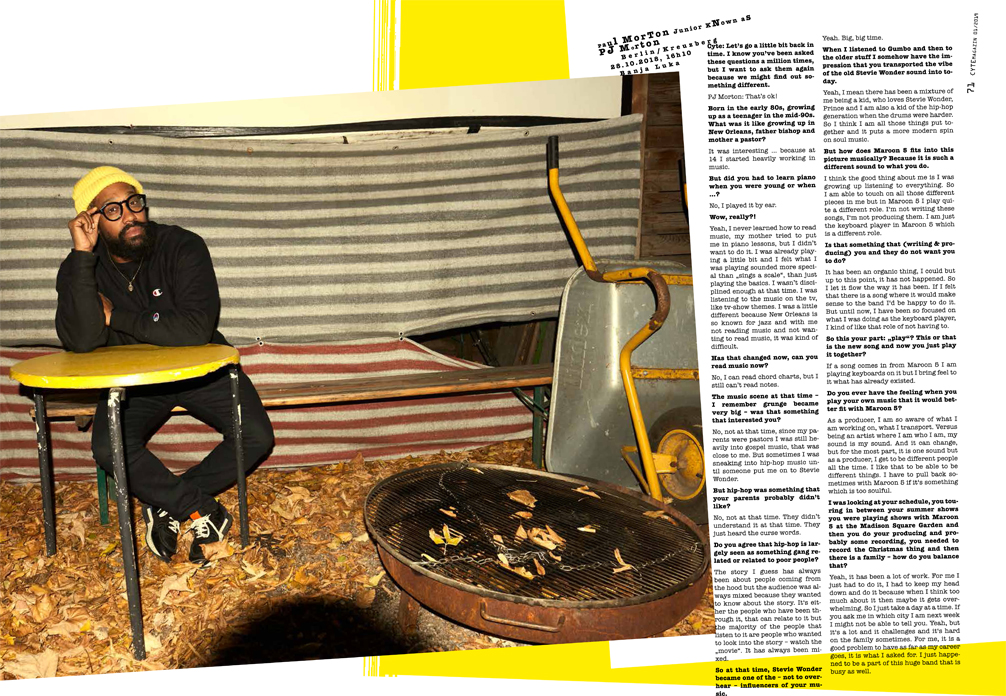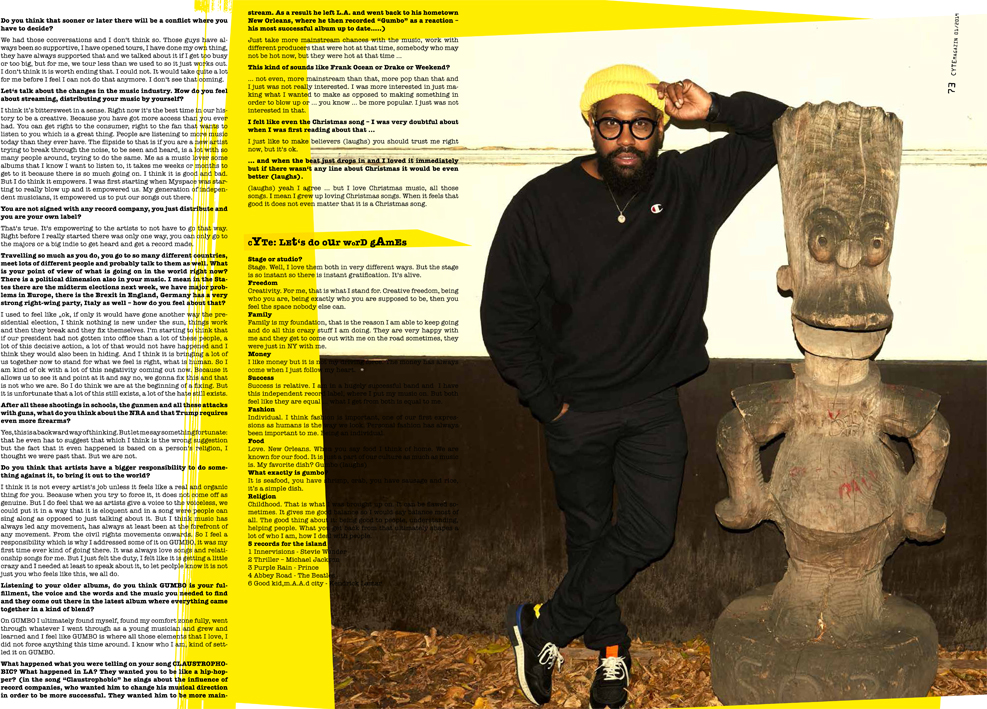


Paul Morton Junior known as PJ Morton
Berlin/Kreuzberg 28.10.2018, 16h10 Banja Luka
Cyte: Let’s go a little bit back in time. I know you’ve been asked these questions a million times, but I want to ask them again because we might find out something different.
PJ Morton: That’s ok!
Cyte: Born in the early 80s, growing up as a teenager in the mid-90s. What was it like growing up in New Orleans, father bishop and mother a pastor?
PJ Morton: It was interesting … because at 14 I started heavily working in music.
Cyte: But did you had to learn piano when you were young or when …?
PJ Morton: No, I played it by ear.
Cyte: Wow, really?!
PJ Morton: Yeah, I never learned how to read music, my mother tried to put me in piano lessons, but I didn’t want to do it. I was already playing a little bit and I felt what I was playing sounded more special than „sings a scale“, than just playing the basics.
I wasn’t disciplined enough at that time.
I was listening to the music on the tv, like tv-show themes. I was a little different because New Orleans is so known for jazz and with me not reading music and not wanting to read music, it was kind of difficult.
Cyte: Has that changed now, can you read music now?
PJ Morton: No, I can read chord charts, but I still can’t read notes.
Cyte: The music scene at that time – I remember grunge became very big – was that something that interested you?
PJ Morton: No, not at that time, since my parents were pastors I was still heavily into gospel music, that was close to me. But sometimes I was sneaking into hip-hop music until someone put me on to Stevie Wonder.
Cyte: But hip-hop was something that your parents probably didn’t like?
PJ Morton: No, not at that time. They didn’t understand it at that time. They just heard the curse words.
Cyte: Do you agree that hip-hop is largely seen as something gang related or related to poor people?
PJ Morton: The story I guess has always been about people coming from the hood but the audience was always mixed because they wanted to know about the story. It’s either the people who have been through it, that can relate to it but the majority of the people that listen to it are people who wanted to look into the story – watch the „movie“. It has always been mixed.
Cyte: So at that time, Stevie Wonder became one of the – not to overhear – influencers of your music.
PJ Morton: Yeah. Big, big time.
Cyte: When I listened to Gumbo and then to the older stuff I somehow have the impression that you transported the vibe of the old Stevie Wonder sound into today.
PJ Morton: Yeah, I mean there has been a mixture of me being a kid, who loves Stevie Wonder, Prince and I am also a kid of the hip-hop generation when the drums were harder. So I think I am all those things put together and it puts a more modern spin on soul music.
Cyte: But how does Maroon 5 fits into this picture musically? Because it is such a different sound to what you do.
PJ Morton: I think the good thing about me is I was growing up listening to everything. So I am able to touch on all those different pieces in me but in Maroon 5 I play quite a different role. I’m not writing these songs, I’m not producing them. I am just the keyboard player in Maroon 5 which is a different role.
Cyte: Is that something that (writing & producing) you and they do not want you to do?
PJ Morton: It has been an organic thing, I could but up to this point, it has not happened. So I let it flow the way it has been. If I felt that there is a song where it would make sense to the band I’d be happy to do it. But until now, I have been so focused on what I was doing as the keyboard player, I kind of like that role of not having to.
Cyte: So this your part: „play“? This or that is the new song and now you just play it together?
PJ Morton: If a song comes in from Maroon 5 I am playing keyboards on it but I bring feel to it what has already existed.
Cyte: Do you ever have the feeling when you play your own music that it would better fit with Maroon 5?
PJ Morton: As a producer, I am so aware of what I am working on, what I transport. Versus being an artist where I am who I am, my sound is my sound. And it can change, but for the most part, it is one sound but as a producer, I get to be different people all the time. I like that to be able to be different things. I have to pull back sometimes with Maroon 5 if it’s something which is too soulful.
Cyte: I was looking at your schedule, you touring in between your summer shows you were playing shows with Maroon 5 at the Madison Square Garden and then you do your producing and probably some recording, you needed to record the Christmas thing and then there is a family – how do you balance that?
PJ Morton: Yeah, it has been a lot of work. For me I just had to do it, I had to keep my head down and do it because when I think too much about it then maybe it gets overwhelming. So I just take a day at a time. If you ask me in which city I am next week I might not be able to tell you.
Yeah, but it’s a lot and it challenges and it’s hard on the family sometimes. For me, it is a good problem to have as far as my career goes, it is what I asked for. I just happened to be a part of this huge band that is busy as well.
Cyte: Do you think that sooner or later there will be a conflict where you have to decide?
PJ Morton: We had those conversations and I don’t think so. Those guys have always been so supportive, I have opened tours, I have done my own thing, they have always supported that and we talked about it if I get too busy or too big, but for me, we tour less than we used to so it just works out. I don’t think it is worth ending that. I could not. It would take quite a lot for me before I feel I can not do that anymore. I don’t see that coming.
Cyte: Let’s talk about the changes in the music industry. How do you feel about streaming, distributing your music by yourself?
PJ Morton: I think it’s bittersweet in a sense. Right now it’s the best time in our history to be a creative. Because you have got more access than you ever had. You can get right to the consumer, right to the fan that wants to listen to you which is a great thing. People are listening to more music today than they ever have. The flipside to that is if you are a new artist trying to break through the noise, to be seen and heard, is a lot with so many people around, trying to do the same. Me as a music lover some albums that I know I want to listen to, it takes me weeks or months to get to it because there is so much going on. I think it is good and bad. But I do think it empowers. I was first starting when Myspace was starting to really blow up and it empowered us. My generation of independent musicians, it empowered us to put our songs out there.
Cyte: You are not signed with any record company, you just distribute and you are your own label?
PJ Morton: That’s true. It’s empowering to the artists to not have to go that way. Right before I really started there was only one way, you can only go to the majors or a big indie to get heard and get a record made.
Cyte: Travelling so much as you do, you go to so many different countries, meet lots of different people and probably talk to them as well. What is your point of view of what is going on in the world right now? There is a political dimension also in your music. I mean in the States there are the midterm elections next week, we have major problems in Europe, there is the Brexit in England, Germany has a very strong right-wing party, Italy as well – how do you feel about that?
PJ Morton: I used to feel like „ok, if only it would have gone another way the presidential election, I think nothing is new under the sun, things work and then they break and they fix themselves. I’m starting to think that if our president had not gotten into office than a lot of these people, a lot of this decisive action, a lot of that would not have happened and I think they would also been in hiding. And I think it is bringing a lot of us together now to stand for what we feel is right, what is human. So I am kind of ok with a lot of this negativity coming out now. Because it allows us to see it and point at it and say no, we gonna fix this and that is not who we are. So I do think we are at the beginning of a fixing. But it is unfortunate that a lot of this still exists, a lot of the hate still exists.
Cyte: After all these shootings in schools, the gunmen and all these attacks with guns, what do you think about the NRA and that Trump requires even more firearms?
PJ Morton: Yes, this is a backward way of thinking. But let me say something fortunate: that he even has to suggest that which I think is the wrong suggestion but the fact that it even happened is based on a person’s religion, I thought we were past that. But we are not.
Cyte: Do you think that artists have a bigger responsibility to do something against it, to bring it out to the world?
PJ Morton: I think it is not every artist’s job unless it feels like a real and organic thing for you. Because when you try to force it, it does not come off as genuine. But I do feel that we as artists give a voice to the voiceless, we could put it in a way that it is eloquent and in a song were people can sing along as opposed to just talking about it. But I think music has always led any movement, has always at least been at the forefront of any movement. From the civil rights movements onwards. So I feel a responsibility which is why I addressed some of it on GUMBO, it was my first time ever kind of going there. It was always love songs and relationship songs for me. But I just felt the duty, I felt like it is getting a little crazy and I needed at least to speak about it, to let peolple know it is not just you who feels like this, we all do.
Cyte: Listening to your older albums, do you think GUMBO is your fulfillment, the voice and the words and the music you needed to find and they come out there in the latest album where everything came together in a kind of blend?
PJ Morton: On GUMBO I ultimately found myself, found my comfort zone fully, went through whatever I went through as a young musician and grew and learned and I feel like GUMBO is where all those elements that I love, I did not force anything this time around. I know who I am, kind of settled it on GUMBO.
Cyte: What happened what you were telling on your song CLAUSTROPHOBIC? What happened in LA? They wanted you to be like a hip-hopper? (in the song “Claustrophobic” he sings about the influence of record companies, who wanted him to change his musical direction in order to be more successful. They wanted him to be more mainstream. As a result he left L.A. and went back to his hometown New Orleans, where he then recorded “Gumbo” as a reaction – his most successful album up to date…..)
PJ Morton: Just take more mainstream chances with the music, work with different producers that were hot at that time, somebody who may not be hot now, but they were hot at that time …
Cyte: This kind of sounds like Frank Ocean or Drake or Weekend?
PJ Morton: … not even, more mainstream than that, more pop than that and I just was not really interested. I was more interested in just making what I wanted to make as opposed to making something in order to blow up or … you know … be more popular. I just was not interested in that.
Cyte: I felt like even the Christmas song – I was very doubtful about when I was first reading about that …
PJ Morton: I just like to make believers (laughs) you should trust me right now, but it’s ok.
Cyte: … and when the beat just drops in and I loved it immediately but if there wasn’t any line about Christmas it would be even better (laughs).
PJ Morton: (laughs) yeah I agree … but I love Christmas music, all those songs. I mean I grew up loving Christmas songs. When it feels that good it does not even matter that it is a Christmas song.
Cyte: Let’s do our word games
Cyte: Stage or studio?
PJ Morton: Stage. Well, I love them both in very different ways. But the stage is so instant so there is instant gratification. It’s alive.
Cyte: Freedom
PJ Morton: Creativity. For me, that is what I stand for. Creative freedom, being who you are, being exactly who you are supposed to be, then you feel the space nobody else can.
Cyte: Family
PJ Morton: Family is my foundation, that is the reason I am able to keep going and do all this crazy stuff I am doing. They are very happy with me and they get to come out with me on the road sometimes, they were just in NY with me.
Cyte: Money
PJ Morton: I like money but it is not my driving force. The money has always come when I just follow my heart.
Cyte: Success
PJ Morton: Success is relative. I am in a hugely successful band and I have this independent record label, where I put my music on. But both feel like they are equal … what I get from both is equal to me.
Cyte: Fashion
PJ Morton: Individual. I think fashion is important, one of our first expressions as humans is the way we look. Personal fashion has always been important to me. Being an individual.
Cyte: Food
PJ Morton: Love. New Orleans. When you say food I think of home. We are known for our food. It is just a part of our culture as much as music is. My favorite dish? Gumbo (laughs)
Cyte: What exactly is gumbo?
PJ Morton: it is seafood, you have shrimp, crab, you have sausage and rice, it’s a simple dish.
Cyte: Religion
PJ Morton: Childhood. That is what I was brought up on. It can be flawed sometimes. It gives me good balance so I would say balance most of all. The good thing about it: being good to people, understanding, helping people. What you get back from that ultimately shapes a lot of who I am, how I deal with people.
Cyte: 5 records for the island
PJ Morton:
1 Innervisions – Stevie Wonder
2 Thriller – Michael Jackson
3 Purple Rain – Prince
4 Abbey Road – The Beatles
6 Good kid,m.A.A.d city – Kendrick Lamar
CREDITS
Photograph: Stephan Ziehen #stephanziehen – Interview: Henrike Heick #lousalo